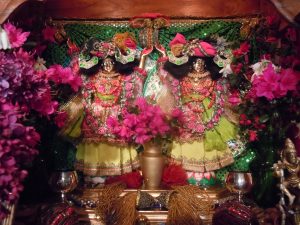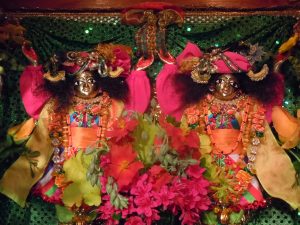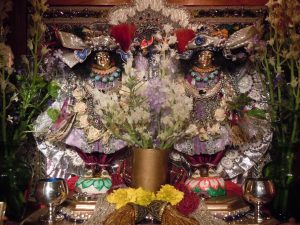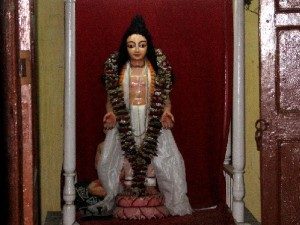
72-08-26 letter
My Dear Gaurasundara,
Please accept my blessings. I am in due receipt of your letter dated August 20, 1972, and I am quite surprised to read it. This does not sound like you. All along I have been discouraged in every way by my Godbrothers, but still I have stuck to my duty, keeping my Spiritual Master always in front. Because there is some fighting or bickering amongst us, that does not mean that I should go away. If I have understood the order of my Spiritual Master rightly, then I must perform my duty under any circumstances and never one think of going away under disgust. I have appointed you to be my GBC representative in South America because I think that you are very much responsible and capable to do it, and I am very fond of you and your good wife Govinda dasi for helping me all along. So do not be disturbed or worried by some small thing, rumor, or misunderstanding. There is no plot amongst our so-called big men against you or Siddha-swarup Ananda. That is childish.
Where have you got this idea to retire and simply translate books? That is not in our line. My Spiritual Master has given me the instruction to spread this movement all over the world and you are my good disciples, are helping me do this. Without your good help I could not have done anything, so practically you can take all the credit for spreading this Krsna Consciousness movement and fulfilling the prophecy of Lord Caitanya Mahaprabhu. If there is some incident and I claim that no one is cooperating with me or no one will work with me, that is my defect, not theirs. The Vaisnava devotee must think like this. We should not find fault with others and criticize and go away, that is not the Vaisnava way.Better we should always be willing to offer all respects to others and consider them as our superiors always.
Meanwhile, hoping this meets you in good health,

SB 3.29.16-The devotee should regularly see My statues in the temple, touch My lotus feet and offer worshipable paraphernalia and prayer. He should see in the spirit of renunciation, from the mode of goodness,and see every living entity as spiritual.
SB 3.29.22-One who worships the Deity of Godhead in the temples but does not know that the Supreme Lord, as Paramātmā, is situated in every living entity’s heart, must be in ignorance and is compared to one who offers oblations into ashes.
SB3.29.23-One who offers Me respect but is envious of the bodies of others and is therefore a separatist never attains peace of mind, because of his inimical behavior towards other living entities.
SB3.29.24-My dear Mother, even if he worships with proper rituals and paraphernalia, a person who is ignorant of My presence in all living entities never pleases Me by the worship of My Deities in the temple.
SB3.29.25-Performing his prescribed duties, one should worship the Deity of the Supreme Personality of Godhead until one realizes My presence in his own heartand in the hearts of other living entities as well.
SB 3.29.26-As the blazing fire of death, I cause great fear to whoever makes the least discrimination between himself and other living entities because of a differential outlook.
PURPORT-There are bodily differentiations among all varieties of living entities, but a devotee should not distinguish between one living entity and another on such a basis; a devotee’s outlook should be that both the soul and Supersoul are equally present in all varieties of living entities.

SB 9.4.69 purport–A Vaiṣṇava is always an object of envy for nondevotees, even when the nondevotee happens to be his father. To give a practical example, Hiraṇyakaśipu was envious of Prahlāda Mahārāja, but this envy of the devotee was harmful to Hiraṇyakaśipu, not to Prahlāda. Every action taken by Hiraṇyakaśipu against his son Prahlāda Mahārāja was taken very seriously by the Supreme Personality of Godhead, and thus when Hiraṇyakaśipu was on the verge of killing Prahlāda, the Lord personally appeared and killed Hiraṇyakaśipu. Service to a Vaiṣṇava gradually accumulates and becomes an asset for the devotee. Similarly, harmful activities directed against the devotee gradually become the ultimate cause of the performer’s falldown. Even such a great brāhmaṇa and mystic yogī as Durvāsā was in a most dangerous situation because of his offense at the lotus feet of Mahārāja Ambarīṣa, a pure devotee.
Cc. Adi-lila : Adi 8:15
Śrīla Bhaktisiddhānta Sarasvati Ṭhākura comments in this connection that people in general, in their narrow-minded conception of life, create many different types of humanitarian activities, but the humanitarian activities inaugurated by Śrī Caitanya Mahāprabhu are different.For logicians who want to accept only that which is proven through logic and argument, it is a fact that without logic and reason there can be no question of accepting the Absolute Truth. Unfortunately, when such logicians take to this path without the mercy of Śrī Caitanya Mahāprabhu, they remain on the platform of logic and argument and do not advance in spiritual life. However, if one is intelligent enough to apply his arguments and logic to the subtle understanding of the fundamental spiritual substance, he will be able to know that a poor fund of knowledge established on the basis of material logic cannot help one understand the Absolute Truth, which is beyond the reach of imperfect senses. The Mahābhārata therefore says: acintyāḥ khalu ye bhāvā na tāṁs tarkeṇa yojayet. (Mahābhārata, Bhīṣma-parva 5.22) How can that which is beyond the imagination or sensory speculation of mundane creatures be approached simply by logic? Logic and argument are very poor in spiritual strength and always imperfect when applied to spiritual understanding. By putting forward mundane logic one frequently comes to the wrong conclusion regarding the Absolute Truth, and as a result of such a conclusion one may fall down to accept a body like that of a jackal.

BG 4.39–A faithful man who is absorbed in transcendental knowledge and who subdues his senses quickly attains the supreme spiritual peace.
PURPORT-Such knowledge in Kṛṣṇa consciousness can be achieved by a faithful person who believes firmly in Kṛṣṇa. One is called a faithful man who thinks that, simply by acting in Kṛṣṇa consciousness, he can attain the highest perfection. This faith is attained by the discharge of devotional service, and by chanting “Hare Kṛṣṇa, Hare Kṛṣṇa, Kṛṣṇa Kṛṣṇa, Hare Hare/ Hare Rāma, Hare Rāma, Rāma Rāma, Hare Hare,” which cleanses one’s heart of all material dirt. Over and above this, one should control the senses. A person who is faithful to Kṛṣṇa and who controls the senses can easily attain perfection in the knowledge of Kṛṣṇa consciousness without delay.



